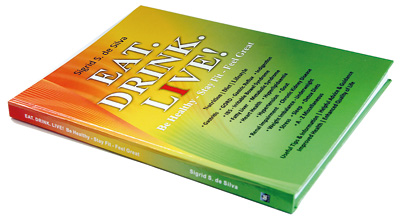Am I too thin?
View(s):‘Eat. Drink. Live! is Consultant Dietician Sigrid S. de Silva’s third book and includes a wealth of information on nutrition, diet and lifestyle changes. In this book, Sigrid, while explaining the importance of diet and nutrition for healthy living, also answers many topical food related questions.
 The book also looks at several common conditions such as Gastritis, Irritable Bowel Syndrome, Hypertension, Stress, Heart Health, etc and provides practical and doable nutrition help and advice on lifestyle approaches to dealing with them.
The book also looks at several common conditions such as Gastritis, Irritable Bowel Syndrome, Hypertension, Stress, Heart Health, etc and provides practical and doable nutrition help and advice on lifestyle approaches to dealing with them.
“I felt the need to write this book so that you may benefit by gaining better knowledge on balanced nutrition in combination with a balanced lifestyle to prevent, reverse, control or cure a health problem and /or to prevent side-effects and complications whilst maintaining the best achievable level of health and wellbeing,” she writes in her foreword.
Published here is an extract from the book from the chapter ‘Information and Guidance for ‘Skinny’ People’:
The worrying problem faced by thin and/or underweight individuals (whilst surrounded by plenty of foods) is nearly eclipsed due to the growing obesity epidemic.
Firstly it needs to be established if you are clinically underweight, too lean or simply slender, very slim yet healthy.
Individual healthy bodyweight varies greatly and depends on many factors such as age, gender, race/ ethnicity, genetics, weight history and overall health status.
 If your parents were very slim at your current age, you may have inherited the lean genes.
If your parents were very slim at your current age, you may have inherited the lean genes.
Am I clinically underweight?
There are several ways to make an assessment and it is best to perform more than one of the following to determine if the individual is truly underweight.
BMI- Body Mass Index
The BMI is calculated by dividing kg bodyweight by the square of your height in metres.
Eg:
Bodyweight
55 kg
Height 1.68 m
55: (1.68x 1.68)=
BMI 19.5 ( normal range)
A BMI of 10-20% below the recommended BMI of 18 can still be considered acceptable and healthy for a person of South East Asian origin depending on factors such as genetics and weight history.
Skinfold Assessment
The required weight, lean body mass percentage, body fat percentage is calculated by measuring skinfolds. This type of assessment is usually performed by an experienced physiologist or suitably qualified healthcare professional. Age, race, ethnicity, weight history, genetics, current health status are also taken into consideration.
This type of assessment is likely to be the most accurate indication/ diagnosis.
Broca Method
An appropriate guidance is the Broca Method. Check height in cm and deduct 100.
Thereafter deduct 33%. If you weigh less than the figure calculated you may be clinically underweight.
Example:
168cm -100 = 68
68-33% = 45.5 kg
( minimum bodyweight)
Weight charts
Standard height weight charts are usually too general and do not take the individuality of each person into account and can only be of use for approximate guidance.
Comprehensive clinical
assessment
Evaluation criteria
Height, bodyweight, skinfold assessment/bodymass composition, medical and surgical history, health check/current health status, consideration of genetics, weight history, metabolic rate, average daily nutrient intake, meal timing, food diary, 24 hour food recall
Assessment of the possibility of an eating disorder
Please note: it makes a difference if a person is slender, lean, very slim for years without any recent change in body weight, as opposed to unexplained rapid or gradual weight loss
Common reasons for being
underweight, skinny
Possible causes
Apart from a genetic predisposition the most common causes for individuals to be thin, skinny or even underweight with the availability of food is often due to erratic meal timings in combination with the skipping of meals and snacks
A food diary will help to assess the actual food and energy intake as well as reveal meal timing
Other reasons to consider
- Stress, worries and subsequent loss of appetite
- Not getting enough sleep, breaking rest on a regular basis
- Excessive activity, exercise
- Psychological and medical conditions; Tests, reports and investigations are necessary to check for possible underlying medical and psychological problems ,i.e. Hyperthyroidism, gastritis, gastrointestinal problems, endocrine disorders and eating disorders.
If being underweight is entirely nutrition and lifestyle related, you need to visit a dietician or nutritionist who will understand your individual problem.
If emotional or stress issues have led to weight loss, it is advisable to consult a psychologist, a counsellor, or talk to a trustworthy person, and follow stress management guidelines.
If you think you are suffering from an eating disorder, multipronged treatment is the most successful with a psychologist/psychoanalyst being the most important healthcare professional attending in combination with a trusted physician, dietician, nutritionist as well as supportive family members and friends.
Does being underweight have any negative consequences?
Many underweight very slim individuals are healthy and fit, they are just meant to be that way and this should not only be accepted, but embraced.
For some however, a low bodyweight can lead to a weakened immune system, lack of energy and reduced physical stamina, especially if healthy nutrition basics combined with sensible meal and snack timing have not been observed, causing a deficit of adequate nutrients, vitamins and minerals.
Females who are underweight may find that their periods stop, indicating a poor nutritional status and/or decreased hormonal function due to lack of adequate presence of body fat. This is an alarming situation which requires appropriate attention.
Problems concerning psychology and stress management which require counseling need to be treated with special care.
How can I gain weight, body mass?
Weight gain guidance
Nutrition and lifestyle-related issues can be reversed positively by embarking on a structured nutrition therapy and lifestyle routine.To be able to gain weight sensibly, get used to a healthy rhythm.
- Aim to gain weight gradually, not more than 1 kg per month. Weight increased too fast may lead to unhealthy body fat deposits, especially in the tummy area.
- Eat three main meals at regular set times: Breakfast within 3 hours of getting up, lunch at 1 p.m., whilst dinner is best eaten at 8 p.m. or earlier.
- Add 3 snacks (such as dried fruit, banana, avocado, nuts, almonds, dairy foods and fluids, nutritious drinks, granola bars, healthy biscuits, crackers and cheese, toasties) to your daily energy intake
- Meal and snack timings are of great importance
- The first snack is best taken within 1 hour of getting up, maybe with a cup of tea/coffee. A second snack is preferably consumed at around 10.30 a.m. whilst the afternoon snack is well placed at around 4 p.m. A night snack maybe necessary if you go to sleep later than 10 p.m.
- Remember that it is not all about calories, but healthy balanced nutrition
- Do not snack at all times (grazing) since this will decrease food intake at main mealtimes and can lead to skipping these
- Do not indulge in a snack ‘on the way’ as soon as you reach home after a hectic day, but head straight to the dinner table
- Do not consume foods and fluids if you have an aversion to the taste
- n Get sufficient sleep, 7-8 hours of sleep is considered adequate for individuals with low body fat percentage
- The intake of vitamin and mineral supplements maybe necessary during the first two months of diet and lifestyle therapy
- Once nutrition status has improved and energy levels have increased, it is of immense benefit to start regular exercise for fitness and good health, body shape, toning, as well as increasing body muscle mass. Physical activity also helps stimulate appetite
Please consult a suitable healthcare professional for a more individualized diagnosis and or detailed advice
Others say…helpful tips.
Comments like ‘Your arms are like chopsticks’ or ‘be careful the wind does not blow you away’ are not a diagnosis, but can make you feel miserable nonetheless! Ignore these comments.
It is good to remember that for every ‘skinny’ person, there may be hundreds, if not thousands, who wish they were more slender, and wish to be lean, even if they do not voice it.
If you are rather slim, even thin, but otherwise healthy, you need to realise and accept that it’s just the way you are. Be happy, positive and try to feel good about yourself!
You may also benefit from sensible fashion tips and advice on what to wear. The way you dress can make a big difference towards the way you look and feel.
Please note
Rapid or gradual weight loss without apparent reason always requires a comprehensive clinical assessment.
(Eat. Drink. Live! is available at Vijitha Yapa Bookshops and other leading bookstores)


